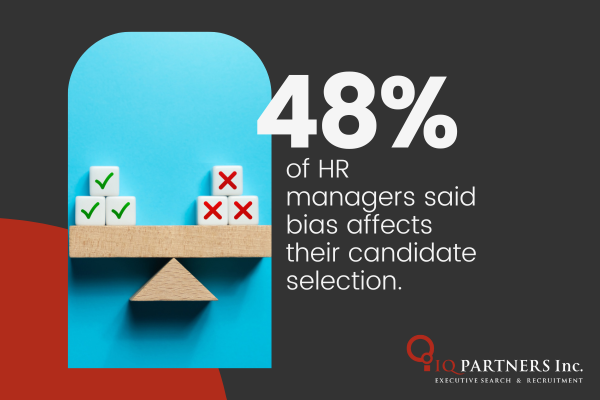Everyone has bias. It’s prominent in recruitment and something that we work with our clients to reduce during the job interview process. Just how prevalent is it? According to BrightTalk, 79% of HR professionals believe unconscious bias exists in recruitment. 48% of HR managers said bias affects their candidate selection.
Why is this happening? Too many hiring managers rely on intuition when interviewing candidates, which leads to bias. Awareness of how you could be skewing something is essential to making better decisions.

Since there is the potential for legal implications related to bias, and as a DEI-focused organization ourselves, our legal recruiters in Toronto have a keen interest in the role bias plays in the recruitment process. So, I asked them to tell me what they thought were the negative impacts of unconscious bias. Then I asked for advice on how to minimize the impact of unconscious bias on the job interview process. Here’s what they had to say:
What is the Negative Impact of Unconscious Bias in the Hiring Process?
A biased job interview process is doing your company a disservice. It can be discriminatory and have negative repercussions such as:
- Lack of diversity within your organization
- It can hurt your ability to hire the best talent in your industry
- You could develop skill and knowledge gaps, resulting in lower performance and profitability
- You could develop a poor employer brand and hurt future recruitment efforts

How Can I Minimize The Impact of Unconscious Bias in the Job Interview Process?
Minimizing the impact of unconscious bias in the job interview process is crucial for fostering a diverse and inclusive workplace. Here are several strategies to achieve this:
- Structured Interviews: Develop a set of standardized questions for all candidates applying for the same position. This ensures that each candidate is evaluated on the same criteria. Use a consistent scorecard to assess candidate responses objectively. Define clear criteria for evaluating each answer.
- Diverse Interview Panels: Assemble interview panels with diverse members in terms of gender, race, ethnicity, and other characteristics. Diverse panels bring multiple perspectives and can reduce individual biases.
- Blind Recruitment Processes: Remove identifying information such as names, addresses, and schools from resumes during the initial screening process. This can prevent biases related to gender, ethnicity, or socioeconomic background. Use anonymized skill assessments or work samples to evaluate candidates based on their abilities rather than their personal characteristics.
- Bias Awareness and Training: Provide training for all employees involved in the hiring process to raise awareness of unconscious biases and their impact on decision-making. Encourage ongoing education and discussions about diversity, equity, and inclusion within the organization.
- Behavioural Interview Techniques: Use behavioural interview questions that ask candidates to describe how they have handled specific situations in the past. This approach focuses on past performance and behaviour rather than subjective impressions. Encourage candidates to use the STAR method to structure their responses, making it easier to compare their experiences objectively.
- Feedback and Accountability: Conduct post-interview reviews where interviewers can discuss their impressions and provide feedback. This collaborative approach can help identify and mitigate individual biases. Hold interviewers accountable for their decisions by tracking their hiring outcomes and addressing any identified biases.
- External Audits: Periodically engage third-party auditors (our team can help!) to review your hiring processes and provide unbiased feedback on potential areas of improvement. Compare your hiring practices and outcomes with industry standards to ensure you are meeting best practices for diversity and inclusion.
By implementing these strategies, employers can create a more equitable and inclusive hiring process, minimizing the impact of unconscious bias and promoting a diverse workforce.
A Word on DEI at IQ PARTNERS
As a company that helps other companies ‘hire better’, it is our responsibility to cultivate diversity, equity, and inclusion within our own organization and to help our clients build diverse and inclusive teams.
Via our partnership with The Canadian Centre for Diversity and Inclusion (CCDI), EVERY employee of IQ PARTNERS has completed at least 10 hours of DEI Training to ensure that our recruitment efforts reflect the best DEI practices. We encourage applications from candidates of every race, gender, age, religion, identity, and experience, and we’re committed to operating an inclusive, barrier-free recruitment and selection process for all our searches. We also provide accommodation for any candidate that requires assistance due to a disability or medical need.
Check Out More Job Interview Advice From Our Recruiters
Many Companies Are Embracing Blind Hiring to Combat Bias. Are You?
How to Hire Great Candidates Without Bias or Discrimination in 6 Easy Steps
Managing a Remote Workforce? Use These 12 Tips to Avoid Proximity Bias





